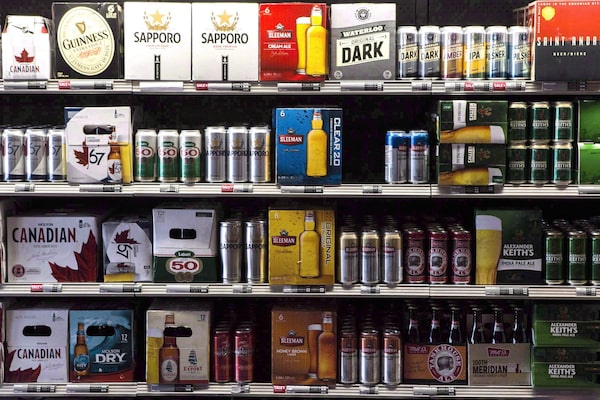
An impending report comes as other parts of the alcohol business have been urging Mr. Ford’s Progressive Conservative government to liberalize the industry well beyond the campaign promise on beer and wine.Chris Young/The Canadian Press
A special adviser to the Ontario government is poised to release recommendations on potentially sweeping changes to the province’s alcohol regime, even as Premier Doug Ford remains at loggerheads with the industry-owned Beer Store over his promise to allow sales of beer and wine in corner stores.
Former Alberta cabinet minister Ken Hughes, appointed to advise Finance Minister Vic Fedeli on loosening Ontario’s alcohol rules, told The Globe and Mail on Thursday that a special report on possible changes to the way Ontarians buy alcohol is “imminent” – and could be released within days or weeks. But he said it had not been finalized and would not reveal what it will propose.
His impending report comes as other parts of the alcohol business have been urging Mr. Ford’s Progressive Conservative government to liberalize the industry well beyond the campaign promise on beer and wine. Lobbyists have been making the case for more radical changes, including letting private-sector standalone liquor retail chains compete with the Liquor Control Board of Ontario (LCBO).
“When you are talking about modernizing the whole ecosystem, effectively, all the ways in which we distribute and sell alcohol beverages in Ontario, I think it’s fair to say that we’re listening to everybody," Mr. Hughes said, adding the government has made clear it will not sell off the LCBO.
Meanwhile, the government is locked in an escalating battle with the big, foreign-owned breweries that control the quasi-monopoly Beer Store. Beer-industry sources have warned that opening up a deal signed by the previous Liberal government in order to put beer in corner stores could cost Ontario hundreds of millions of dollars in penalties, force beer prices to rise and threaten 7,000 Beer Store jobs.
Mr. Hughes has dismissed the warnings as fearmongering. Legal experts say Mr. Ford could pass legislation overriding the contract, although the foreign-owned breweries could make claims for compensation under the terms of trade deals. On Thursday, Mr. Hughes would not comment on talks with the Beer Store. A spokesman for the Beer Store could not be reached.
Representatives of Edmonton-based Alcanna Inc., which operates more than 200 liquor retailers in Alberta, British Columbia and Alaska, has been meeting with Progressive Conservative MPPs and staffers to make its case for standalone private-sector liquor stores in Ontario. The company has hired lobbyist Melissa Lantsman of Hill+Knowlton Strategies, who headed Mr. Ford’s war room in last spring’s election campaign.
Alcanna has several different liquor chains and just opened a branch of its marijuana arm, Nova Cannabis, in Toronto; it is already gearing up for expansion. Earlier this month, it announced it had secured $70-million in bank financing for its new cannabis business and for new stores under its high-end Wine and Beyond banner, including locations in Ontario “if the Ontario government’s reform of liquor retail so permits.”
Company spokesman David Crapper said the government appears open-minded, but is concentrating on the Beer Store for now. He says he has met with staff and backbenchers, but not the Premier or Mr. Hughes. (Mr. Hughes was a partner in an Alberta alcohol retailer in the 1980s that was bought by Alcanna. He said he has not had a stake in the business for about a decade.)
“We’re hopeful that the discussion could be broadened a little bit beyond what they’re talking about now,” Mr. Crapper said. “And we think that would be good for consumers.”
Some critics say opening up liquor sales could mean a decline in the billions of dollars the Ontario government rakes in from the LCBO. But Mr. Crapper points to numbers that show the opposite is true in B.C., where government retailers remain a presence, as well as in Alberta. Most government revenue in both provinces still comes from controlling the wholesale side of the alcohol business, Mr. Crapper said, as private-sector players must still obtain their liquor through a government-controlled entity.
Other lobbyists have also been bending the government’s ear. Jan Westcott, president and chief executive officer of the Association of Canadian Distillers, argues his members should be allowed to sell their whisky, vodka, gin or other hard liquor alongside beer and wine in corner, grocery and big-box stores. Asked about this idea, Mr. Hughes noted it was not something Mr. Ford’s government had promised.
The Beer Store, primarily owned by the foreign brewing giants that control Labatt, Molson and Sleeman, launched ads this week that targeted the government’s corner-store plans, as did the union representing Beer Store workers. In response, the Retail Council of Canada and other industry associations that support Ontario’s liberalization push are set to launch a public-relations website aimed at countering the beer industry’s claims.
Critics accuse Mr. Ford’s government of having an obsession with alcohol. With the long weekend approaching, Mr. Fedeli, Ontario’s Finance Minister, put out images on Twitter of beers from brewers answering his government’s call for “buck-a-beer.” The government is also loosening rules to allow tailgating and restaurants to serve alcohol at 9 a.m.
Ontario NDP Leader Andrea Horwath said the government has no plans to address the side effects of increased drinking, and argued the changes could see the loss of unionized Beer Store jobs and see more alcohol end up in the hands of minors.
“We don’t think it’s a priority," Ms. Horwath said. “We think the government should be focused on our education system, our health system. More access to booze is not a priority for New Democrats.”
 Jeff Gray
Jeff Gray